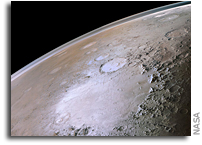Astrobiology Then and Now

Astrobiology Has Arrived: A Personal Recollection, Keith Cowing
“I am currently attending the Astrobiology Science Conference where the world’s astrobiologists all meet to showcase their results and share ideas. There was a time, barely 20 years ago, when there were no astrobiologists. I was one of the lucky people to be present as this amazing 21st century discipline came into existence.”









when i was in school, at one point I tried to change my major to astrobiology (independent study). They told me no because it was a science without a subject.
This is still the case.
The same thought crossed my mind: much ado about nothing, i.e., the entire field remains a discipline operating in the realm, ultimately, of speculation.
Even paleontology, which involves a LOT of interpolation across some mighty large gulfs, possesses its array of actual physical data that it can hold in its hands. In contrast, astrobiology reminds me of the caricature (often used to bolster a defense of the superiority of science) of a group of philosophers sitting around debating this or that seemingly unresolvable (by pure argument) question involving Nature.
Life’s prevalence in the universe (or not) certainly remains as one of the big questions and it merits serious inquiry. However, thus far the field has only one genuine & irrefutable positive sample to examine & study: Earth’s biosphere. I suppose that many, many folks are anxiously hoping that the sample set increases…some day.
I hope some philosophers are participating in the meeting…
Astrobiology is not only about finding life elsewhere; it is about understanding life on this planet. Because of astrobiology we have a much better understanding of the huge variety of conditions under which life can flourish. Right here on Earth.
I believe we are speaking of the difference between primary purpose/underlying meaning and means to acheiving that end. We must be careful regarding the application of the word ‘about’ because the discussion here thus far hinges on its possible range of meaning.
I would offer that in the pursuit of finding extraterrestrial biology to study (which still lacks actual extant data of said subject) which is THE defining objective of the field of astrobiology (what ab is ‘about’), participants in said field have investigated various avenues of biological research including what you describe.
Astrobiology per se is NOT ‘about’ understanding life here on Earth in all its variety and range of environs; that falls under the broad umbrella of biology. That folks in the field of ab are digging deeper into extreme environments, etc, is perhaps best characterized as a spin-off of ab’s pursuit of alien life. Astrobiology as a discipline ‘includes’ these investigations & studies, but I would hold that astrobiology as a discipline/field is not ‘about’ them.
And I was simply noting that the “entire field” in fact is not operating in the realm of speculation.
I’m not sure if I would say there were no astrobiologists around twenty years ago. The whole ALH84001 business started in 1996, and that’s definitely astrobiology. Lab work on pre-biotic chemistry, e.g. the Miller-Urey experiments, is older and also, arguably, astrobiology. The term itself may be more recent (I remember when it was exobiology), but I think the field goes back more than twenty years.